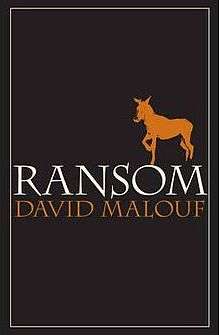Ransom (Malouf novel)
 First edition | |
| Author | David Malouf |
|---|---|
| Country | Australia |
| Language | English |
| Publisher | Chatto & Windus |
Publication date | 2009 |
| Media type | Hardcover |
| Pages | 230 |
| ISBN | 0099539527 |
Ransom (2009) is a novel by Australian author David Malouf. It retells the story of the Iliad from books 22 to 24.
Summary
This story begins with Achilles mourning the death of Patroclus during the Trojan War. Achilles, enraged at his friend's death, slays Hector, Patroclus' killer, and drags Hector's corpse behind a chariot around the walls of Troy. Achilles drags Hector's corpse behind his chariot around Patroclus' funeral pyre each morning for the following ten days, much to the dismay of the Trojans and his own men. The narrative shifts between Achilles and Priam, Hector's father, and the King of Troy. Priam cannot stand the abuse of his beloved son's body. Priam and Achilles loss are juxtaposed throughout the novel. Priam decides that he will approach Achilles without his royal decorations, mortal to mortal, and attempt to ransom Hector's body back with treasure. Priam then explains his plan to his family and advisers, who meet it with resistance. After acquiring a common cart driver from the market square Priam and his driver set out for the Greek camp. With guidance from Hermes, Priam eventually meets Achilles at his tent, where the exchange is made. Priam appeals to Achilles conscience, reminding him of his own father and son, in trying to persuade him to return Hector to Troy for a proper burial. The retelling ends with the proper burial of Hector, within the walls of his home city.
Differences from the Iliad
There are several textual differences between the Iliad and Ransom. The character Somax, who drives the cart Priam rides en route to his negotiations with Achilles, is not mentioned in the original text. This leads to a drastically different interaction with Hermes in Ransom.[1] Priam and Achilles are covered in much more detail in Ransom, leading to further textual differences.
Critical reception
Ransom was shortlisted for the 2011 International IMPAC Dublin Literary Award.[2] It received the 2009 John D. Criticos Prize for Greek literature.[3] The book received positive reviews from the New York Times Book Review, the Dallas Morning News, the New Yorker, the San Francisco Chronicle, the Washington Post, the Los Angeles Times, the Boston Globe, and the Wall Street Journal and many other publications[4]
References
- ↑ "Book 23" February 18, 2013
- ↑ "William Trevor makes an Impact", Irish Times, April 12, 2011
- ↑ "Past Winners", February 18, 2013
- ↑ "Editorial review excerpts" February 18, 2013